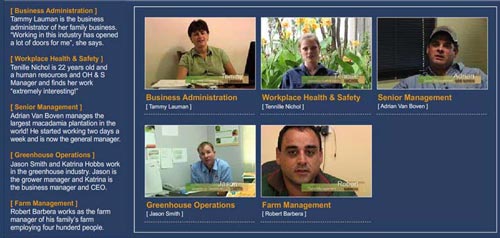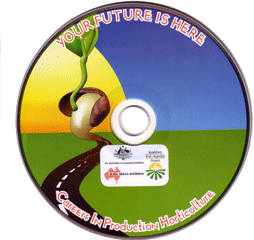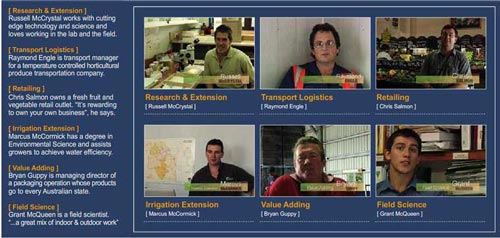Careers in Horticulture
The Careers Pathway Website gives everyone valuable information on the Horticulture Industry and the opportunities it can offer to you.
There is a great variety of interesting and rewarding career paths in the dynamic and vibrant Production Horticulture Industry.
This The Careers Pathway Website, DVD & CD aims to excite and inspire you by showcasing examples of success and offering a way to examine these opportunities more closely.
The DVD “Your Future is Here” highlights real life success stories of individuals working within the Production Horticulture supply chain.
Case studies provide an entertaining snapshot of the diverse range of career opportunities that exist, with key tips on how to make the most of your future in the Industry.
A CD ROM outlines exciting career pathways in the Production Horticulture Industry. Tasks associated with various employment levels are detailed, including recommended Skills required to undertake these tasks and suggested Training available to acquire these skills.
This is a great mapping tool which will allow individuals to plan their future in this vital and energetic sector of the Australian economy.
Take a look and find out how you could have an exciting career in Australia’s vibrant and diverse production horticulture Industry.
Plan an exciting and dynamic career in Australia’s vibrant production horticulture Industry. The shortage of people skilled in producing our food offers you a wide choice of interesting career opportunities.
Browse through the wide range of careers that follow and click to view a short interview about what that job involves.
Horticulture operations is mainly about growing things; growing food is essential to our everyday lives.
You might start as a farm hand working in the field and end up running your own business; or you might want to supervise advice on growing crops.
Horticulture Services enable the horticulture Industry to operate at maximum efficiency by continually improving farm operations and product quality.
Horticulture services occupations are highly varied, including work in irrigation, research and development, transport and logistics.
You could also work in packaging and distribution, adding value to the process or the local grocery shop.
Horticulture Business occupations support production operations. Horticulture needs administrators, office managers, farm managers, sales and marketing staff, as well as environmental and occupational health and safety officers.
The business side of horticulture offers variety and fantastic career possibilities.

Careers in Horticulture
The horticulture Industry offers great opportunities and many career paths.
You can start with a school-based traineeship, apprenticeship or higher qualification … it’s up to you.
Qualifications, skills and competencies are awarded through formal training or recognised prior learning.
Each level of skill builds your experience and allows you to progress as far as you want in horticulture.
This production was developed by Bundaberg Fruit and Vegetable Growers Cooperative Limited
with support from the Commonwealth Government and Rural Skills Australia.
Carbon Footprint for the Vegetable Industry
Horticulture Australia Limited (HAL), have released a series of discussion papers on the carbon footprint of the Australian vegetable industry.
The discussion papers and industry workshop, were funded by HAL through the vegetable growers levy with matching funding from the Australian Government.
The papers provide useful information including an estimate of the carbon footprint of the
Australian vegetable industry.
- Horticulture is estimated to contribute 1 per cent of Australian
agricultural emissions. - Agriculture contributes 16 per cent of all Australian emissions.
Follow these links to download the discussion papers :
Paper 1: What is a carbon footprint
Paper 2: Emissions trading, reduction and marketing
Paper 3: Available carbon footprinting tools
Paper 4: Estimate of the Carbon Footprint
Paper 5: Who will use the vegetable carbon tool?
Paper 6: Mitigating greenhouse gas emissions
See Also:
VG 05051 : A Scoping Study into Climate Change and Climate Variability
Deuter, P. QDPI (2006) – extract
- The impact of climate change on horticulture may be significant, some positive, some not.
- Most of the anticipated climate changes will call for a very high standard of crop management.
- Successfully adapting to increasing temperatures and changing rainfall patterns will require both pre-emptive and reactive adaptation strategies / options.



